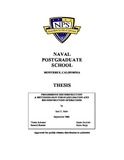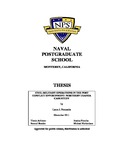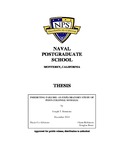Game theory and the warrior diplomat interagency cooperation in stability and reconstruction operations
| dc.contributor.advisor | Giordano, Frank | |
| dc.contributor.author | Irmischer, Drew M. | |
| dc.date.accessioned | 2012-03-14T17:44:07Z | |
| dc.date.available | 2012-03-14T17:44:07Z | |
| dc.date.issued | 2010-12 | |
| dc.identifier.uri | https://hdl.handle.net/10945/5079 | |
| dc.description.abstract | The U.S. has become increasingly involved with failed and failing states since the end of the Cold War in the 1990s. Further, failed and failing states are forecast to remain a national security issue well into the future. United States involvement with failed and failing states has primarily focused around reconstruction and stability operations, and crisis management efforts. Previous reconstruction and stability efforts have been wrought with inefficiency and agency stovepipes. The United States believes a whole government approach is the solution to effective reconstruction and stability operations. While most agree, interagency cooperation is imperative to the whole government approach, interagency cooperation is difficult to achieve in practice. The United States State Department has been placed in charge of reconstruction and stability operations but has limited resources available. The Department of Defense is the only agency with the resources available. The Department of State and Department of Defense resources, organizational structure, and capabilities are compared. Reconstruction and stabilization efforts of Provincial Reconstruction Teams in Afghanistan and Iraq are examined. An analysis utilizing Game Theory is performed to determine key mechanisms increasing interagency collaboration during reconstruction and stability operations. | en_US |
| dc.description.uri | http://archive.org/details/gameoryndwarrior109455079 | |
| dc.format.extent | xiv, 77 p. : ill., maps ; | en_US |
| dc.publisher | Monterey, California. Naval Postgraduate School | en_US |
| dc.rights | This publication is a work of the U.S. Government as defined in Title 17, United States Code, Section 101. Copyright protection is not available for this work in the United States. | en_US |
| dc.subject.lcsh | Insurgency | en_US |
| dc.title | Game theory and the warrior diplomat interagency cooperation in stability and reconstruction operations | en_US |
| dc.type | Thesis | en_US |
| dc.contributor.secondreader | Wilson, Gregory | |
| dc.contributor.corporate | Naval Postgraduate School (U.S.) | |
| dc.contributor.department | Information Operations | |
| dc.description.service | US Air Force (USAF) author | en_US |
| dc.identifier.oclc | 698375888 | |
| etd.thesisdegree.name | M.S. | en_US |
| etd.thesisdegree.level | Masters | en_US |
| etd.thesisdegree.discipline | Information Operations | en_US |
| etd.thesisdegree.grantor | Naval Postgraduate School | en_US |
| etd.verified | no | en_US |
| dc.description.distributionstatement | Approved for public release; distribution is unlimited. |
Files in this item
This item appears in the following Collection(s)
-
1. Thesis and Dissertation Collection, all items
Publicly releasable NPS Theses, Dissertations, MBA Professional Reports, Joint Applied Projects, Systems Engineering Project Reports and other NPS degree-earning written works.





